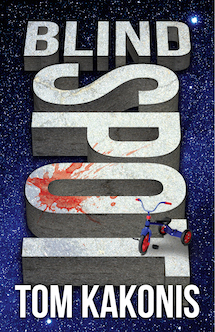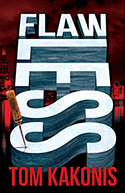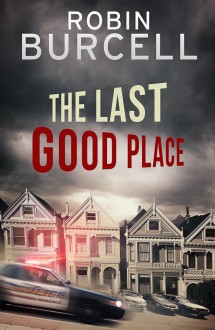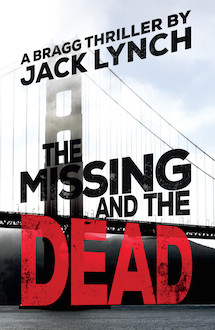
Author Tom Kakonis tells the unusual story behind his haunting thriller BLIND SPOT, and why he originally published it, and his novel FLAWLESS, under the doomed pseudonym “Adam Barrow.”
In the late afternoon of a fine summer day many years ago, my wife and I were driving down one of those Interstates that ring the city of Chicago like a hangman’s noose. She, a suburban native of that city, was behind the wheel, I rode shotgun. Since it was nearing rush hour, that perpetually traffic-clogged highway was swarming with vehicles plunging headlong toward only god knew where. But as we approached a toll station, all of us began first to gradually decelerate, then slow to a crawl, then stop altogether. Those of us foolishly unprepared settled into columns leading to the inexact change booths. Our file proceeded at a maddeningly glacial pace, but then so did those on either side of us.
Now, it is appropriate at this point in my little anecdote to explain that at this time I was still in the midst of my writing career (more accurately, near its tail end, but that’s another story) and so was accustomed to the careful notice of my surroundings. Whoever knew where a random description or an unusual event or an original thought might originate?
An Unexpected Inspiration
I glanced to my left: my wife’s features taut with the tension of traffic. To my right was a tacky, mud-caked vehicle piloted by a youngish-looking man whose face was a veritable map of frustration, anxiety, and, it appeared to me, scarcely bottled rage. In the passenger seat was a woman whose expression, what there was of it, seemed to convey a kind of sluggish, empty vacancy, a dismal surrender to some irresistible force. And affixed to a rear window, driver’s side, was an amateurishly fashioned poster featuring a photo of a young male child underscored with the entreaty “Have you seen me?” and in fine print what looked to be instructions for contacting what I presumed to be the couple up front. Our cars were about parallel in our respective lanes, and then, capriciously, their’s stalled while ours inched slowly ahead. Before we left them completely behind, I nudged my wife, called her attention to the scene, and with all the casual, thoughtless cruelty that sadly seems to afflict all of us at one time or another, I remarked, “What if I were to mouth the words ‘I know that kid!’ and you were to speed away?”
I did not, of course, speak them, but no sooner had those speculative words escaped my lips than I was overtaken with an illumination, and the skeleton of the story that would become Blind Spot seemed to emerge behind my eyes like a mystic vision endowed with shape and substance and form.
What if?
It’s the deceptively short, simple question that can spark a full-length narrative. Of all the books I’ve written, published and unpublished, Blind Spot came easiest. Through my wife’s connection I knew a bit about suburban Chicago, enough to supply a setting. I had a brother-in-law who worked as a millwright in the sprawling (though now vanished) Reynolds Aluminum plant and through whose good offices I was granted access to a world utterly foreign to me. From that split-second glimpse at the highway toll booth I had prototypes for some of my central characters. And as we paid our fee and did, in fact, in the very real world of time and space and griefs and sorrows and personal tragedies and occasional tarnished triumphs, speed away through that exhaust-poisoned air, it occurred to me I had even the genesis of a theme in the obsessive, single-minded search of a father for his lost son, and the dramatic reversal to which such a search might finally lead him.
Thusly, out of a chance encounter and a cruelly careless utterance was Blind Spot born.
 Enter Adam Barrow
Enter Adam Barrow
Now and again someone will ask me why I published this novel (and Flawless before it) under a pseudonym. The simplest answer is bad advice and my own naivete. My first four books had been well-reviewed but had not sold particularly well. It was the inspired notion of my then editor (since deceased) at my then publisher to bring those two books out under a new name, trading on the wholly fabricated tale of a remarkable new talent who would, of course, be me. Promise of an extensive promotional campaign and the equally implied (though never articulated) threat of little to nothing in the way of promotion if I refused to participate in this scheme came with the editor’s inspiration. With no guidance I reluctantly agreed, crafted myself a name, Adam Barrow, and eagerly awaited the results.
The rest, as they say, is a bleak history. Nothing in the way of promotion materialized, neither novel earned out its advance, both vanished ignominiously and without a trace, and shortly thereafter my ties with the publisher (and editor and agent) were severed for good. Slow study that I was, this experience was enough to sour me on the glamour of “being a writer,” and so I put up my pen and retired into the world of “normalcy.”
Until Lee Goldberg appeared out of the past, and Brash Books was founded, and my forgotten books were made available again. In the case of Blind Spot, now available for pre-order, my hope is that any new readers enjoy it as much as I enjoyed writing it.


